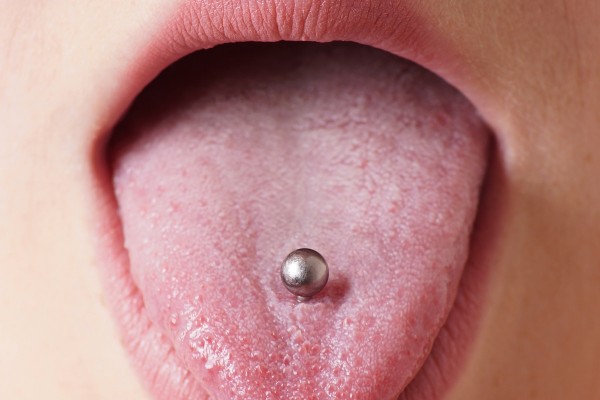Oral piercings have become a popular form of self-expression among many young people, and even some older ones. However, this form of self-expression comes at a price, since it can lead to a number of complications and health issues which can be fairly serious. The kinds of negative issues that can result from oral piercings reads like a laundry list, and even a partial listing can be exhaustive.
When you have a piercing of the lips, tongue, or cheek performed, you can be subject to airway obstructions, hypersalivation, swelling, bleeding, chipped teeth, gingival recession, infections, scarring or lacerations, palatal erythema, keloid formation, as well as discharges from the area which was pierced. The American Dental Association (ADA) strongly recommends against the practice of oral piercing. These are seen as invasive cosmetic procedures which carry significant health risks, and which outweigh any possible benefit of improved self-image.
Problems Associated With Oral Piercing
Any kind of oral piercing is in effect an incision, and as such it will cause pain and probably swelling as well, and in some cases even infection. It is also possible for prolonged bleeding to occur, since the tongue is vascular in nature, and blood vessels may be punctured. When tongue jewelry is inserted, it has the potential for obstructing airways, and this could present a respiratory issue. Oral jewelry can also cause a problem for dental diagnosis, because it can obscure the anatomy and cause abnormalities to appear in radiographs.
In some cases, jewelry has actually become embedded in the oral tissue surrounding it, and this has necessitated surgery in order to have the jewelry removed. Bacteria is usually present on oral jewelry, and colonies can thrive in the mouth, so as to cause significant oral issues. Complications resulting from oral piercing are extremely common, with as many as 50% of all patients developing issues after oral piercing. People who have their lips pierced are 50% more likely to develop complications resulting from that piercing and 44% of people who have their tongues pierced can expect oral issues. In addition, 26% of individuals with tongue piercings will develop complications afterward.
Problems associated with oral piercings can occur as the piercing is in progress, immediately afterward, or at any time following the procedure. It is even possible for life-threatening situations to develop in individuals who have had oral piercings. In one well-known case, a 25-year-old British female developed a disease called Ludwig’s Angina, which is a rapidly spreading cellulitis issue. Four days after receiving her tongue piercing, she experienced severe swelling in the floor of her mouth, and surgery was necessary to remove the jewelry which had been implanted.
Dental Habits for Oral Piercing Patients
From the above, it can be seen that there are a number of serious health issues which can emerge as a result of oral piercing. Patients who have their tongues, lips, or cheeks pierced, can expect significant pain and swelling for several days following the procedure. During the first few days after the piercing, it is highly recommended for patients to use an alcohol-free mouth rinse to keep the piercing site free of bacteria, and for general cleansing.
To reduce the risk of infection following an oral piercing, individuals are advised to implement and maintain a consistent program of oral hygiene. This should include brushing your teeth at least twice each day with a soft bristle toothbrush and toothpaste that includes fluoride. You should also regularly use floss to remove particles trapped between the teeth, followed by a good rinsing of the mouth with an alcohol-free mouthwash.
It is very important that piercing patients make a routine out of keeping the piercing site clean and free of bacteria. You should also resist the temptation to play with any jewelry that has been placed in the mouth, so that soft tissue does not become damaged. It will be necessary to pay closer attention to your mouth, to monitor the possible development of infections or cavities. Any unusual pain, swelling, or unidentified discharges, should be reported to your dentist so they can be analyzed. Active patients should take the precaution of removing any kind of oral jewelry before participating in athletic endeavors, especially those which involve physical contact and possible collisions.
Dentists’ Views on Oral Piercings
Virtually all dentists agree with the ADA position that oral piercings represent a significant health risk and should therefore be avoided. However, at Good Samaritan Dental Implant Institute, our team of experts understand that individuality is important for many young patients. We will therefore do everything possible to help you maintain good oral hygiene and good dental health.


